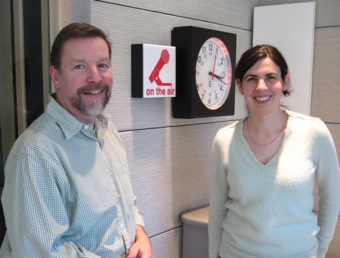Move forms California’s largest science & environmental unit for electronic media

After four years, numerous awards, and something just shy of 900 blog posts, the multimedia reporting effort that’s been known as Climate Watch is turning a significant page. KQED is combining our efforts with Quest, the station’s more broadly-based science and environmental news and programming effort.
We’ll continue to cover climate-related issues, as evidenced by the recent rollout of Heat and Harvest, a major multimedia project with the combined resources of Climate Watch, Quest and the Center for Investigative Reporting. Through a documentary now airing on public television stations throughout California, radio features on The California Report and an extensive lineup of online features, Heat and Harvest examines some of the ways in which climate change is already challenging farmers in the Golden State.
It’s by no means the first successful collaboration between Quest and Climate Watch. Past efforts have produced some high-profile “props,” including a 2011 AAAS Kavli Science Journalism Award for our TV segment on rising seas in the Bay Area.
The reorganization will, however, mean suspension of the Climate Watch blog, while we consider options for the most successful web strategy going forward. I’m proud of what we’ve done in this space, with groundbreaking work from our producers, Gretchen Weber and Molly Samuel, engaging, eye-opening posts from our freelance contributors, and unflagging support from our news director, Bruce Koon. I’ll miss doing it. I’ll miss writing and editing the posts and I’ll miss the lively discussions in our comments thread. Okay, most of the lively discussions.
I couldn’t resist going back and seeing what we were writing about when we first launched the blog, in the fall of 2008. Arnold Schwarzenegger was governor, organizing the first in a series of “climate summits.” The newly-elected Barack Obama would make a video appearance at that event and pledge swift, comprehensive federal action on climate change. We’re still waiting. Market analysts were speculating on what the price for a metric ton of carbon would be in California’s nascent cap-and-trade market (we still don’t know but will find out in about a month).
Though it may seem like the climate agenda has moved little in four years, climate change remains one of the critical challenges of our time. That’s becoming more evident with each passing year. Polls indicate that a strong majority of Californians agree, and expect policymakers to attend to both the consequences of a changing climate, as well as continued efforts to stem those consequences. So we’ll continue to monitor and report major developments on the science and policy fronts. Except now, we’ll be doing it with a much larger pool of talent. The KQED Science & Environment team includes a proven stable of writers, video producers and radio reporters, as well as specialists in education, digital production and social media. We’ll still be part of the climate conversation. We hope you will be, too.
4 thoughts on “Climate Watch Joins New KQED Science Unit”
Comments are closed.

Thanks for all the excellent reporting and analysis Craig, Gretchen, and Molly. Looking forward to what comes next. Keep up the good work!
And Matthew, thanks to you and the rest of the staff at the Pacific Institute for providing so much useful research that makes our jobs that much easier. Keep in touch.
please, please start monitoring the sky — atmospheric pollution from geoengineering programs leaving grid lines of aluminium and barium that become white haze. someone has to start exposing what is going on. see the doc “Why in the World are they Spraying” and http://www.geoengineeringwatch.org and californiaskywatch.com for background info…. Julie
saw the heat and harvest program and i was so impressed. classic craig miller: smart and full of important information.